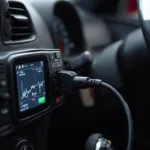The quest for more power is a common pursuit among car enthusiasts, and owners of Volkswagen vehicles with the ABA OBD2 engine are no exception. So, what is max turbo horsepower for VW ABA OBD2? This article dives into the factors influencing potential horsepower gains, explores the limitations of the ABA engine, and discusses safe and reliable methods for increasing performance.
Understanding the VW ABA OBD2 Engine
The 2.0-liter ABA engine, found in various Volkswagen models from the mid-1990s to the early 2000s, is known for its reliability and relative simplicity. While not initially designed for high performance, its robust architecture makes it a suitable candidate for modifications, including turbocharging. However, understanding its limitations is crucial before pursuing significant horsepower gains.
Factors Affecting Max Turbo Horsepower
Several factors determine the maximum horsepower achievable with a turbocharged ABA OBD2 engine. These include:
- Turbocharger Selection: The size and type of turbocharger significantly impact power output. Larger turbos can deliver more boost, but they may suffer from lag at lower RPMs. Smaller turbos spool up faster, providing quicker power delivery, but may limit top-end power.
- Fuel System Upgrades: Increased airflow from a turbocharger necessitates a corresponding increase in fuel delivery. Upgraded fuel injectors, a higher-pressure fuel pump, and a performance fuel regulator are often required.
- Engine Internals: The stock ABA internals, while durable, are not designed for extreme power levels. Forged pistons, connecting rods, and crankshaft are essential for high-boost applications to prevent catastrophic engine failure.
- Tuning and Engine Management: Precise tuning is paramount for maximizing power and ensuring the engine runs safely and efficiently with the added boost. This typically involves using a programmable engine control unit (ECU) or a standalone engine management system.
- Supporting Modifications: Other supporting modifications, such as an upgraded intercooler, exhaust system, and intake, further contribute to maximizing horsepower potential.
Realistic Horsepower Expectations for a Turbo ABA OBD2
While the theoretical maximum horsepower can vary widely based on the extent of modifications, a realistically achievable and reliable power output for a turbocharged ABA OBD2 engine is around 200-250 horsepower with supporting modifications and proper tuning. Pushing beyond this threshold significantly increases the risk of engine damage.
Safe and Reliable Power Upgrades
It’s essential to prioritize reliability and longevity when modifying any engine, including the ABA. Starting with a well-maintained engine and choosing high-quality components are crucial steps. Working with experienced tuners and mechanics who specialize in Volkswagen performance upgrades is highly recommended.
What’s a safe boost level for a stock ABA?
A conservative boost level of around 6-8 psi is generally considered safe for a stock ABA engine with supporting fuel and tuning upgrades. Higher boost pressures require significant internal modifications to ensure engine longevity.
How much horsepower can I gain with bolt-on modifications?
With basic bolt-on modifications, such as an intake, exhaust, and chip tuning, horsepower gains can range from 20 to 40 horsepower, depending on the specific components and tuning.
Maximizing Performance While Maintaining Reliability
The key to maximizing horsepower while maintaining reliability lies in a balanced approach. Selecting appropriate components, investing in professional tuning, and prioritizing engine health are essential for achieving long-term performance gains without compromising the engine’s integrity.
What are the signs of overboosting?
Signs of overboosting include detonation (knocking), excessive exhaust gas temperatures, and a significant drop in power. Ignoring these signs can lead to severe engine damage.
Conclusion
Determining the max turbo horsepower for a VW ABA OBD2 engine involves considering various factors, including turbocharger selection, fuel system upgrades, and supporting modifications. While significant power gains are possible, prioritizing a balanced approach that emphasizes reliability and engine health is crucial for long-term enjoyment. By carefully selecting components, investing in professional tuning, and understanding the engine’s limitations, VW ABA owners can unlock exciting performance potential while preserving the engine’s longevity.
FAQ
- Is it safe to turbocharge a stock ABA engine? While possible, it’s generally recommended to upgrade supporting components, such as the fuel system and engine management, before increasing boost significantly.
- What is the best turbo for an ABA engine? The ideal turbocharger depends on the desired power output and driving characteristics. Smaller turbos offer quicker spool-up, while larger turbos provide higher peak power.
- Do I need to upgrade my fuel injectors for a turbo ABA? Yes, upgrading the fuel injectors is essential to provide the additional fuel required for the increased airflow from the turbocharger.
- What kind of tuning is required for a turbo ABA? Professional tuning is crucial for maximizing power and ensuring the engine runs safely with the added boost.
- What are the common problems associated with turbocharged ABA engines? Common issues can include overboosting, detonation, and oil leaks, often stemming from improper tuning or inadequate supporting modifications.
- How can I monitor the health of my turbocharged ABA engine? Using an OBD2 scanner can help monitor vital engine parameters, such as boost pressure, air/fuel ratio, and exhaust gas temperatures.
- What are some recommended upgrades for a turbo ABA engine? Upgrading the intercooler, exhaust system, and intake can further enhance performance and reliability.
Need help with your OBD2 scanner or have more questions? Contact us via WhatsApp: +1(641)206-8880, Email: [email protected] or visit our office at 789 Elm Street, San Francisco, CA 94102, USA. Our 24/7 customer support team is ready to assist you.


